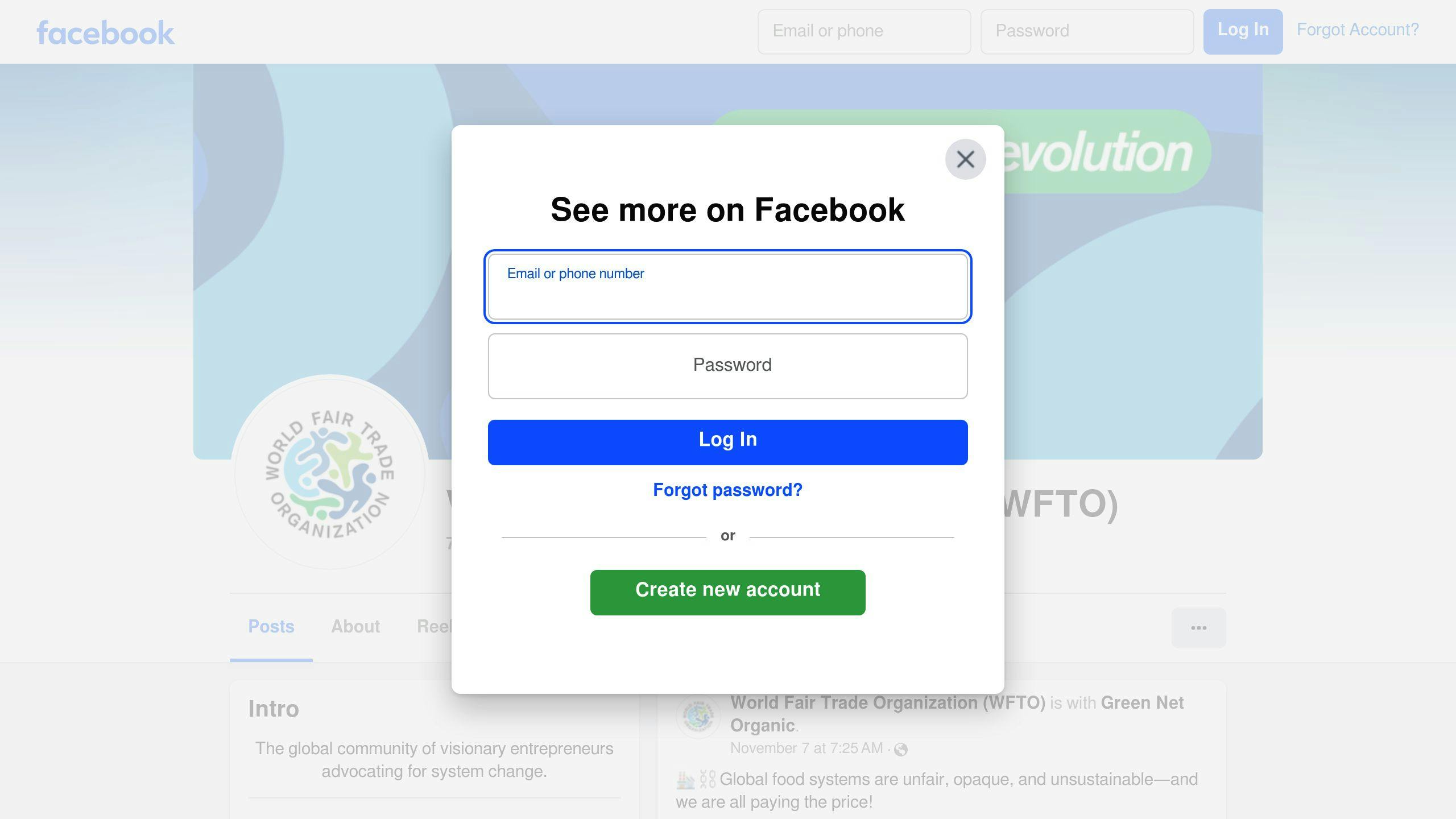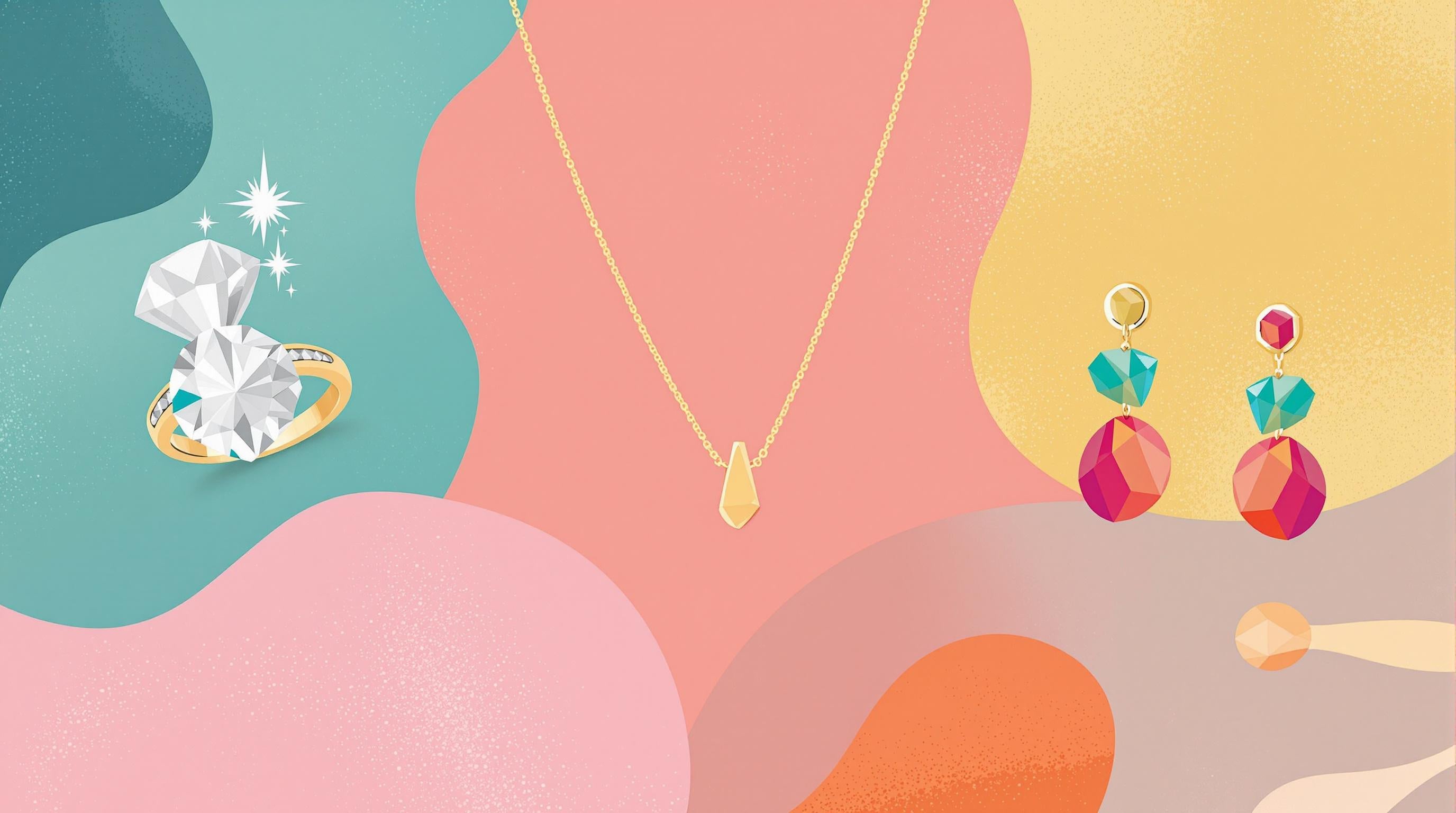Want to buy jewelry that looks good and does good? Here's what you need to know about ethical jewelry in 2024:
- What it is: Jewelry made with fair labor, traceable materials, and eco-friendly practices
- Key certifications: Fairtrade Gold, Fairmined Gold, Fair for Life
- How to spot it: Look for certification labels and transparent sourcing info
- Why it costs more: Fair wages, better working conditions, community investment
- Best way to buy: Direct from makers or certified ethical brands
Quick comparison of gold certifications:
| Certification | Minimum Price | Premium |
|---|---|---|
| Fairtrade Gold | 95% LBMA price | $2,000/kg for community |
| Fairmined Gold | 95% LBMA price | $4/g ($6 for Eco Gold) |
Remember: Ethical jewelry isn't just pretty - it changes lives. Miners in Peru now earn triple their previous income thanks to fair trade practices.
Ready to shop smarter? Let's dive into the details of how to buy jewelry that sparkles inside and out.
Related video from YouTube
Fair Trade Rules and Standards
Fair trade jewelry isn't just bling - it's about making a real difference. Let's break down the rules that make this possible.
World Fair Trade Organization Rules

The World Fair Trade Organization (WFTO) sets the bar high with their 10 Principles of Fair Trade:
- Create opportunities for disadvantaged producers
- Be transparent and accountable
- Practice fair trading
- Pay a fair price
- No child or forced labor
- No discrimination, gender equality
- Ensure good working conditions
- Build capacity
- Promote fair trade
- Respect the environment
These aren't just nice ideas - they're game-changers. Take fair pricing: artisans get at least 95% of the daily gold price set by the London Bullion Market Association. That's cash in miners' pockets, transforming lives.
"We want to create a fairer world for everyone to live in, and we think the 10 Principles explain exactly how we think this can be done." - One World Shop
Gold Certification Types
When it comes to ethical gold, two big players emerge: Fairtrade Gold and Fairmined Gold. Both support small-scale producers, but they're not identical twins:
Fairtrade Gold:
- Certified by Fairtrade International
- Minimum 95% of LBMA gold price
- $2,000 premium per kilo for community projects
- FLOCERT does the auditing
Fairmined Gold:
- Alliance for Responsible Mining (ARM) certifies
- Also 95% minimum of LBMA gold price
- $4 per gram premium ($6 for Eco Gold)
- Bi-annual purchase logs, triennial audits
Both are making waves. The Íquira Cooperative in Colombia? Since joining Fairmined in 2014, they've cut mercury use by 80%. That's change you can see.
Fairmined offers three flavors for jewelers:
1. Fairmined Labeled
For those who want to slap that Fairmined seal on their bling.
2. Fairmined Incorporated
For businesses weaving Fairmined gold into their supply chain.
3. Fairmined Certificates
Support the cause without handling the gold directly.
Choosing between Fairtrade and Fairmined? It often boils down to what a jeweler needs and how much they care about tracing their gold. Fairmined's stricter logging might appeal to those who want to know every step of their gold's journey.
How Ethical Jewelry is Made
Ethical jewelry isn't just about the end product. It's about the entire process, from the mine to your jewelry box. Let's take a look at how these shiny gems come to life while keeping people and the planet in mind.
Tracking Materials
Tracing materials in the jewelry world is tough, but it's a must. Here's how it's done:
Mass Balance: Fairtrade uses this system. It's like mixing fair trade and regular ingredients, but keeping count of the fair trade stuff. This helps more farmers join in.
"Given the depth of poverty experienced by many small-scale farmers, and the urgency of their need for better terms of trade, this mass balance solution has given thousands of farmers the opportunity to benefit from Fairtrade."
Chain of Custody: This tracks every step of a jewel's journey. It's not perfect - sometimes it treats all gold from one company the same. But it's a start.
Certifications: Look for Fairtrade Gold and Fairmined Gold labels. These aren't just stickers. They're promises that the gold comes from mines that treat workers well and care for the environment.
Work and Earth-Friendly Methods
Ethical jewelry isn't just about the materials. It's also about how they're used.
Many jewelers are recycling metals. Hoover and Strong started offering recycled metals in 2008 - first in the U.S. to do so!
Ethical jewelry means no child labor or dangerous mines. The World Fair Trade Organization has 10 rules, including fair pay and good working conditions.
Some jewelers use non-toxic, biodegradable polishing compounds. It's better for workers and the planet.
Ethical sourcing can change lives. In Peru, miners working with fair trade now earn about three times what they did before.
"The average Peruvian miner can now earn about three times what they made before." - Torry Hoover, CEO of Hoover and Strong
Smart jewelers save every scrap. Emily Shaffer, a jewelry artist, says: "I have a scrap bin that holds every single piece of metal waste that I create." It's not just saving money - it's helping the environment too.
Making ethical jewelry isn't easy. It takes care, thought, and hard work. But for those who do it, the result is more than just beautiful - it's a piece of a better world.
sbb-itb-d0b3b91
Buying Direct from Makers
Buying jewelry from makers isn't just about getting a one-of-a-kind piece. It's about putting your money where your values are. When you skip the middlemen, more cash goes straight to the artisans and their communities.
Checking Fair Trade Claims
Before you pull out your wallet, make sure the jewelry maker walks the fair trade talk. Here's how:
- Look for certifications: Fair for Life and Fairtrade International don't just hand out gold stars. They show up and check that makers are playing by the rules.
- Verify the premium: Fair trade certified stuff should come with extra cash for community projects. For example, Fairtrade Gold tacks on $2,000 per kilo for local improvements.
- Ask questions: Don't be afraid to grill makers about where they get their materials. The good ones LOVE to share.
- Check for transparency: Ethical brands usually spill the beans about their supply chain. If they're being cagey, watch out.
Trusted Fair Trade Sellers
Some jewelry makers are knocking it out of the park with ethical practices:
SOKO: These folks team up with Kenyan artisans to build lasting businesses. The result? SOKO artisans rake in 5 times more than your average Kenyan maker.
Brilliant Earth: These guys don't just talk about transparency - they live it. They'll tell you exactly where each diamond comes from, and they get outsiders to double-check their claims.
Kimaï: This hip brand uses recycled gold and lab-grown diamonds. They keep tabs on every step, from the lab to the recycler to the makers in Antwerp.
Nora Sermez Jewelry: Nora's all about luxury handmade gold jewelry. She uses recycled stuff and ethically sourced gems. Each piece has a story, often inspired by symbols and personal tales.
"When you buy sustainable jewelry, you're thinking about the planet and making sure the creators get a fair shake." - Adam Glassman, Creative Director, Oprah Daily
How to Buy Fair Trade Jewelry
Buying fair trade jewelry isn't just about getting something shiny. It's about making a real difference. Here's how to shop smart and support ethical practices:
Reading Certification Labels
When you're looking for fair trade jewelry, certifications are key. They're like secret codes that tell you a piece is the real deal. Here's what to watch for:
Fairtrade Gold: This label means miners got paid fairly. They earned at least 95% of the London Bullion Market Association gold price, plus $2,000 extra per kilo for community projects.
Fairmined Gold: Similar to Fairtrade, but with a twist. Miners still get that 95% minimum, but there's a $4 per gram bonus ($6 for Eco Gold). They also do more frequent check-ins.
Fair for Life: This one looks at the whole supply chain, not just the jewelry part.
"Fair trade certification is a way to show consumers what's happening behind the scenes." - Lisa Bronner, Author and Fair Trade Advocate
These labels aren't just for show. They're backed by real audits and checks.
Understanding the Cost
Fair trade jewelry often costs more. Here's why:
- Workers get paid properly
- Working conditions are better
- Money goes back into communities
- It's often better for the environment
For example, Fairtrade gold miners in Peru now earn about three times what they did before. That's a big change.
When you buy from brands like Brilliant Earth or Nora Sermez Jewelry, you're not just getting jewelry. You're supporting a system that cares about people and the planet.
"Buying sustainable jewelry lets you show your style while making a positive impact." - Made Trade Team
So next time you're looking at jewelry, check for these certifications. Your purchase could be changing lives, one piece at a time.
Main Points to Remember
Diving into ethical jewelry? Here's what you need to know:
Certifications Are Your Friend
Look for labels like Fairtrade Gold and Fairmined Gold. These aren't just fancy stickers. They're guarantees of ethical practices.
Take Fairtrade Gold, for example. It ensures miners get at least 95% of the London Bullion Market Association gold price. Plus, they receive a $2,000 premium per kilo for community projects. That's real impact.
Transparency Tells All
Ethical brands love sharing their sourcing stories. If a jeweler's vague about their supply chain, watch out. That's a red flag.
Companies like Brilliant Earth set the bar high. They offer detailed info on each diamond's origin. That's the kind of transparency you want.
Why Ethical Jewelry Costs More
Yes, ethical jewelry often has a higher price tag. But there's a good reason for it. It ensures:
- Fair wages
- Better working conditions
- Community investment
In Peru, Fairtrade gold miners now earn about triple their previous income. That's life-changing.
It's More Than Just Jewelry
Ethical jewelry isn't just about the final product. It's about the entire process. Look for jewelers who:
- Use recycled metals
- Use non-toxic polishing compounds
- Save metal waste
Emily Shaffer, a jewelry artist, is a great example. She saves every scrap of metal waste. It shows that sustainability can be part of every step.
Buy Direct for Maximum Impact
Want to make the biggest difference? Buy directly from makers or ethical brands.
SOKO is a perfect example. They help Kenyan artisans earn five times more than the average local maker. That's direct impact in action.
Know Your Certifications
Here's a quick guide to some key certifications:
| Certification | What It Means |
|---|---|
| Fairtrade Gold | Miners get 95% minimum of LBMA gold price, plus $2,000/kg for community projects |
| Fairmined Gold | Miners get 95% minimum of LBMA gold price, plus $4/g premium ($6 for Eco Gold) |
| Fair for Life | Covers the entire supply chain |
FAQs
What is the most ethical way to buy jewelry?
Want to buy jewelry without feeling guilty? Here's how:
- Look for fair labor certifications. Brands certified by the Fair Trade Federation or World Fair Trade Organization ensure workers get fair wages and safe working conditions.
Wild Fawn Jewellery puts it this way: "Fair trade certifications ensures that workers making the sustainable jewelry are paid a fair wage and are working in safe working conditions."
- Go for recycled bling. Many brands now use recycled gold, silver, and platinum. It's a win-win: you get gorgeous jewelry, and the planet gets a break from mining.
What is the most ethical material for jewelry?
Recycled metals take the crown here. Why? They're just as good as new metals, but way kinder to the environment.
4ocean, a sustainability champion, says it best: "Recycled metals are a great sustainable and ethical choice when buying sustainable jewelry."
But wait, there's more:
- Lab-grown diamonds: They're identical to mined diamonds, but without the environmental baggage. Wild Fawn Jewellery notes: "Lab-grown diamonds are a far more eco friendly and ethical choice than mined diamonds."
- Responsibly mined gemstones: If you're set on natural gems, do your homework. Look for brands that are transparent about their sourcing and work with certified ethical mines.


Leave a comment